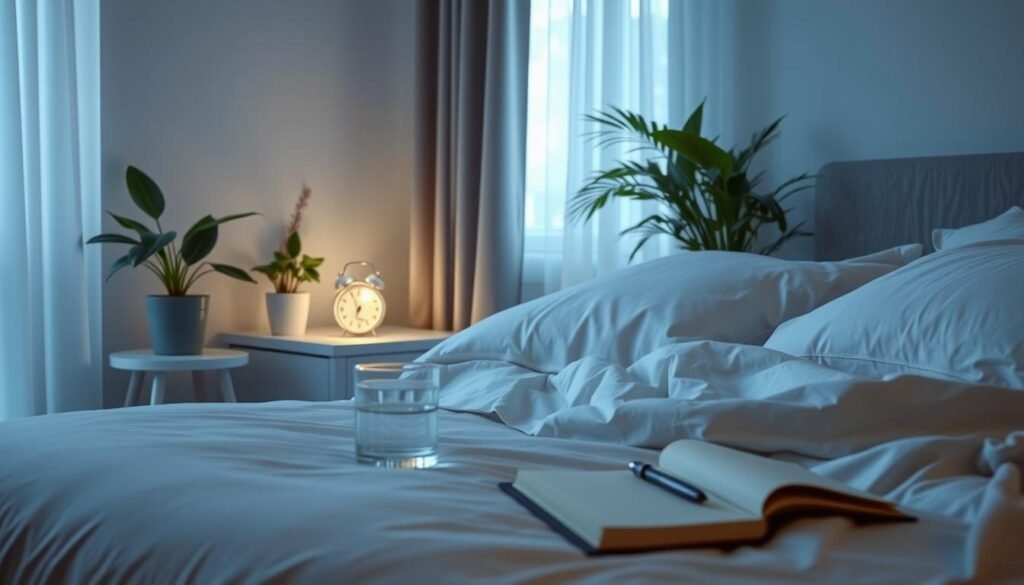Did you know over 60 million Americans have sleep issues? This fact shows how key sleep hygiene is for us. Like personal hygiene keeps us healthy, good sleep habits are crucial for our well-being. Sleep hygiene’s role is huge because it boosts our physical and mental health. This leads to a better quality of life.
Adding simple sleep hygiene steps can really change your life. Sticking to a bedtime routine and trying natural remedies help fight insomnia. These steps lead to better sleep. For great tips on boosting sleep quality, see this guide on natural insomnia solutions. By making sleep hygiene a priority, you reap many rewards. It makes sure you’re refreshed and ready daily.
Key Takeaways
- Good sleep hygiene is essential for physical and mental health.
- Adults require 7-8 hours of sleep per night for optimal health.
- Consistent sleep schedules can lead to improved daytime energy.
- Creating a calming sleep environment enhances sleep quality.
- Engaging in regular physical activity significantly benefits sleep.
- Practices like meditation and writing down worries can refine relaxation.
Understanding Sleep Hygiene
Understanding sleep hygiene is key to a healthy life. It includes habits and settings that help you sleep better. This means creating a bedroom that’s good for sleeping and having a regular bedtime routine.
Definition of Sleep Hygiene
Quality sleep is very important. Good sleep habits involve having a regular sleep schedule. Try to sleep and wake up at the same times every day. Experts say we should get 7 to 8 hours of sleep at night. Also, keep your bedroom cool, between 60 to 67 degrees, for better sleep.
Role of Sleep in Physical and Mental Health
Sleep does more than just rest the body; it’s vital for our health. It helps fix the body and keeps things like metabolism and immune response working right. Not sleeping enough can cause memory problems and make you feel upset. Over time, it can lead to serious health issues like heart disease and diabetes. Sleep also impacts our mental health, linking to anxiety and depression.
To sleep better, change your routine and your environment. Avoid caffeine and screens before bed. Regular exercise helps you fall asleep more easily. For more tips on sleeping better, check out expert tips for quality rest.
Importance of Sleep Hygiene
Good sleep hygiene is key to better health. It affects your energy, mood, and how you think. People with good sleep habits often feel happier and more satisfied with their lives.
Connection to Overall Wellness
Connection to overall wellness is strong with sleep hygiene. In Tabuk city, Saudi Arabia, a study found that bad sleep hygiene led to sleep issues and tiredness during the day. People with good sleep habits had fewer problems.
In fact, 76.5% of those with bad sleep habits had sleep issues. Only 56.1% of those with good habits did. Good sleep is crucial for both mental and physical health.
Impact on Daily Functioning and Mood
The impact of sleep hygiene reaches far. Poor sleep can make you irritable, tired, and less productive. People with bad habits were much more likely to be extremely tired during the day.
About 75.8% of those not sleeping well showed depression signs. Good sleep habits are vital for daily success and emotional well-being.

Benefits of Good Sleep Hygiene
Good sleep hygiene brings many benefits that improve your life. It boosts your daytime energy and mental health. Physical and emotional health get better too.
Increased Daytime Energy Levels
Sticking to good sleep habits makes people feel more awake during the day. They have more energy and feel happier. This makes it easier to do everyday tasks.
Improved Mental Well-being
Sleeping well is great for your mind. It reduces stress and anxiety. A good night’s sleep makes you think clearer and feel more positive.
Enhanced Immune System Function
Good sleep also strengthens your immune system. This means you get sick less often. People who sleep well tend to be healthier overall.
Better Cognitive Performance
Sleeping well makes your brain work better. People say they remember things more easily and focus better. This helps with making decisions and doing well at work or school.

| Benefits | Description |
|---|---|
| Increased Energy Levels | Boosts productivity and allows for better engagement in daily activities. |
| Improved Mental Well-being | Helps reduce stress and anxiety, enhancing emotional stability. |
| Enhanced Immune Function | Strengthens the body’s defenses, leading to fewer illnesses. |
| Better Cognitive Performance | Improves memory, focus, and decision-making abilities. |
Common Sleep Hygiene Practices
Good sleep hygiene can make a big difference in your sleep quality and health. By using strategies for better sleep, you can make nights more restful. Here are some key methods to improve your sleep habits.
Maintaining a Consistent Sleep Schedule
Sticking to a regular sleep schedule helps set your body’s clock. It’s suggested that adults keep a steady wake-up time. This might be even more important than a set bedtime. Aiming for 7 to 8 hours of sleep each night can improve your health and how well you think.
Creating an Optimal Sleep Environment
Your sleeping area should be cool, dark, and silent. The best temperature for sleep is between 60 and 67 degrees Fahrenheit. Comfy beds and little light help you sleep more soundly. This kind of environment is key for good sleep hygiene.
Limiting Screen Time Before Bed
Cutting back on screen time before bed is crucial. Electronics can mess with your melatonin, making it hard to sleep. Try to stop using devices at least an hour before bedtime. Instead, do calming things like reading or meditating to help you sleep better.
Establishing a Relaxing Bedtime Routine
Having a pre-sleep routine tells your body it’s time to relax. Stretch, listen to gentle music, or try deep breathing to calm down. Keeping a regular routine before bed can help you sleep more easily.

| Practice | Description | Impact on Sleep |
|---|---|---|
| Consistent Sleep Schedule | Regular sleep and wake times help regulate the circadian rhythm. | Improves overall sleep duration and quality. |
| Optimal Environment | Cool, dark, and quiet spaces enhance sleep conditions. | Facilitates quicker sleep onset and deeper sleep stages. |
| Limiting Screen Time | Avoiding screens an hour before bedtime promotes melatonin production. | Reduces sleep latency and increases sleep quality. |
| Relaxing Routine | Incorporating calming activities before bed. | Breaks the day’s stress cycle, leading to easier sleep initiation. |
Check out this resource for more tips and research-based advice. Following these practices can lead to better sleep and a healthier life.
Improving Sleep Hygiene
Learning how to better your improving sleep hygiene can really up the quality of your sleep. When you work on sleeping better, you become healthier overall.
Strategies for Better Sleep Habits
Want healthier sleep? Start with these sleep hygiene tips:
- Set a consistent bedtime and wake-up time to adjust your sleep schedule gradually.
- Keep naps under 30 minutes and earlier in the day to avoid night-time sleep issues.
- Spend at least 30 minutes winding down before bed to create a calming pre-sleep routine.
- Avoid using electronic devices in this wind-down time, as they mess with sleep rhythms.
Using Relaxation Techniques
Adding relaxation techniques to your routine helps a lot. Try meditation, deep breathing, or some gentle yoga to lessen stress and relax before bed. Also, make your bedroom calm with a comfy bed, just-right temperature, and little to no noise to improve your sleep quality.
Staying Active and Eating Well
It’s crucial to stay active and eat right for improving sleep hygiene. Exercise raises your mood and energy, helping you sleep better. Do your workouts earlier to avoid being too energized before bed. Also, cut down on caffeine and alcohol for healthier sleep patterns.
The power of improving sleep hygiene is clear. It leads to better sleep, which means more happiness, productivity, and health. Check out even more tips at the Mayo Clinic’s recommendations.
Understanding Bad Sleep Hygiene
Bad sleep hygiene means not caring for your sleep well. It’s about seeing key signs that you’re ignoring your sleep needs. Fixing these can boost sleep quality and health. Sleep gets affected by many things. These include where you sleep, your daily actions, and health issues.
Signs of Poor Sleep Hygiene
It’s vital to spot poor sleep hygiene early. This will help you sleep better and function well each day. Trouble with sleeping, waking up often, feeling sleepy in the day, being moody, and having a hard time focusing are common signs.
- Trouble falling asleep or staying asleep
- Frequent waking during the night
- Excessive daytime sleepiness or tiredness
- Irritability or mood swings
- Difficulty concentrating or focusing during the day
Effects of Poor Sleep Habits on Health
Poor sleep can hurt your body and mind. If you don’t sleep enough, you might face:
- Increased risk of stress and anxiety
- Decreased cognitive function, making everyday tasks challenging
- Heightened appetite, possibly leading to gaining weight
- Weaker immune system, making you get sick more often
- Risk of serious health issues like heart disease and diabetes
To stay healthy, notice and fix poor sleep habits. Good sleep leads to better health and happiness.
The Impact of Sleep Hygiene on Mental Health
Sleep and mental health are closely linked. Not getting enough good sleep can lead to problems like anxiety and depression. Research shows this relationship works both ways. Poor sleep makes mental health issues worse, and mental problems can make it hard to sleep. This is key for anyone wanting to feel better mentally.
Relationship Between Sleep and Mental Disorders
People with mental health problems often struggle to sleep well. For example, those dealing with anxiety might notice worse symptoms from poor sleep. This can make them very tired during the day and mess up their sleep routine. Depression links closely to sleeping problems too. Around 75% of people with depression have trouble sleeping. Working on good sleep habits can help manage these issues. It supports better emotional control.
The Role of Sleep in Emotional Regulation
Good sleep is very important for managing our feelings. Adults should sleep 7 to 9 hours a night for mental well-being. Not sleeping enough can make us stressed and emotionally unstable. This makes daily challenges harder. Diet and the environment, like how warm or bright your room is, affect how well you sleep. By improving sleep habits, you can better control your emotions. This is good for mental health.
Sleep Hygiene Tips for Everyone
To get good sleep, it’s key to make effective practices part of your day. Small changes can greatly improve how well you sleep. It’s about making your bedroom a tranquil place, setting regular sleep times, and avoiding things that keep you up.
Creating a Calming Bedroom Atmosphere
A peaceful sleep environment is crucial for quality rest. Things to consider include:
- Keep the bedroom temperature between 60 and 68°F for optimal comfort.
- Utilize blackout curtains or an eye mask to block out light.
- Limit noise through sound machines or earplugs.
- Reserve the bedroom exclusively for sleep and intimate activities to strengthen mental associations with rest.
Developing Healthy Sleep Patterns
Sticking to a regular sleep schedule matters. This includes going to bed and rising at the same time every day. Aim for a 20-minute flexibility. Also, think about these tips:
- Avoid screen time at least one hour before bedtime to minimize disruptions in melatonin production.
- Limit caffeine and nicotine intake, particularly in the afternoon and evening, as these can interfere with the ability to fall asleep.
- Consider regular exercise, as it can improve sleep quality over time, though the positive effects may take weeks to manifest.
- If struggling to sleep after 20 minutes, get out of bed and engage in a calming activity before attempting to sleep again.
Recognizing and Avoiding Sleep Disruptors
Knowing what disturbs your sleep is important. Common sleep disruptors include:
- Excessive screen exposure, especially close to bedtime.
- Caffeine intake within six hours of sleeping.
- Alcohol consumption, as even a single glass can alter sleep quality.
- Environmental smoke, which contributes to difficulty falling asleep.
- Frequent napping during the day could interfere with nighttime rest; if naps are necessary, keep them around 20 minutes in the early afternoon.
Conclusion
Good sleep hygiene is key to a better, healthier life. It greatly affects our physical and mental health. Taking steps to improve sleep can boost overall well-being.
Getting good sleep does more than just make you feel rested. Keeping a regular sleep schedule helps prevent diseases like obesity and diabetes. It also improves your mood and brain function.
To learn more about sleep’s effects on health, check out this analysis. Focusing on sleep hygiene brings many long-term benefits. It can truly improve your life.